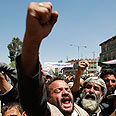
Obama’s Yemen challenge
Op-ed: For US, collapse of Yemen regime amid growing al-Qaeda threat is a nightmare
This deterioration has been accompanied by the increasing weakening of the central regime, which was for many years the main "glue" in holding Yemen’s various tribal elements together. As a result, Yemen has become an increasingly attractive option for al-Qaeda and its local affiliates, al-Qaeda in the Arabian Peninsula (which enjoys the hospitality of the Yemeni tribes). This is likely to continue as long as American military pressure continues to be focused in the Afghanistan-Pakistan area.
The government in Sana’a has so far concentrated its efforts on confronting the two insurgencies within its borders (the separatists in the south and the Shiites in the north), because it deems them a more serious threat to the integrity and stability of the state than the potential threat posed by al-Qaeda in the Arab Peninsula. Furthermore, the president used al-Qaeda "expertise" to fight them in the past. In recent weeks both of these elements caught a tailwind in their ongoing fight against Sana'a and seek to exploit its current weakness to advance their struggle.
Among the scenarios envisioned is that Yemen – like Somalia – might disintegrate into separate autonomous provinces, a scenario that to a large extent is already taking place.
The collapse of Yemen is liable not only to harm the security interests of the nations in the region but also – because of its location near the most important oil producer in the world and one of the most sensitive shipping routes (more than three million barrels of oil pass through the straits of Bab el-Mandeb every day) – to undermine the world’s trade and energy security.
Terrorists to exploit void
The sudden removal of the Yemeni president in a revolutionary manner can send the state into a chaotic situation, which will certainly jeopardize the intensive American efforts to fight the global Jihadists of al-Qaeda and its closest affiliate - the AQAP. This group, a Saudi-Yemeni alliance, would definitely take advantage of the governance void to increase their efforts to regroup, rearm and to carry out new terror attacks within and beyond the region.
Groups like AQAP prefer to base themselves in uncontrolled territorial enclaves. For the United States, which perceives the AQAP as a growing threat to its security not only in the region but also within the US itself, the collapse of the current regime is a nightmare.
Thus the US will support any governmental reforms that may re-solidify the shaken stability of the current regime, including the eradication of corruption, strengthened rule of law, separation of the branches of government, civilian supervision of the security forces, and gradual advances towards democratization from within, processes that Yemen cannot undertake without external assistance (and pressure.)
Indeed, at this stage Yemen seems to be one of the most troubling challenges facing the Obama Administration.
Yoram Schweitzer and Yoel Guzansky are senior researchers at the Institute for National Security Studies
- Follow Ynetnews on Facebook










